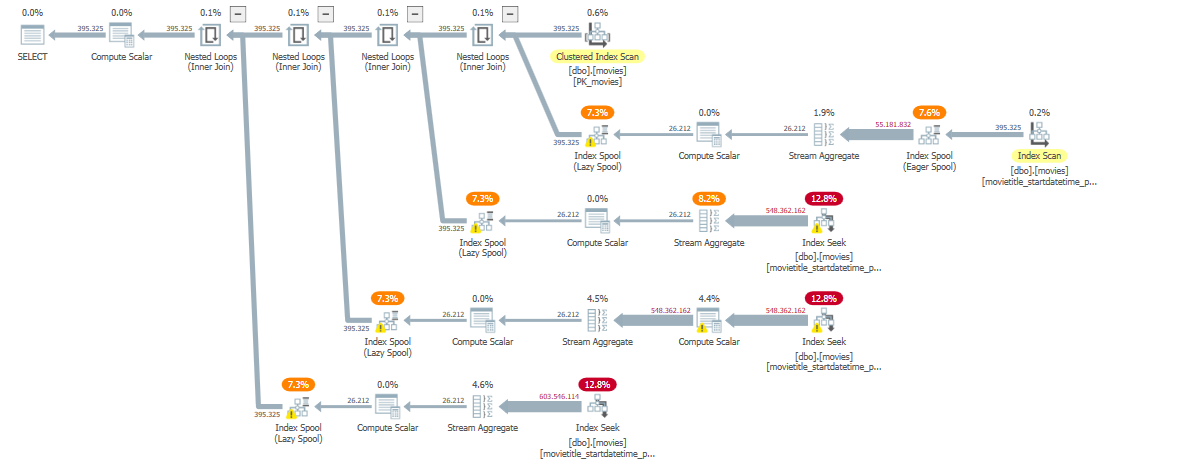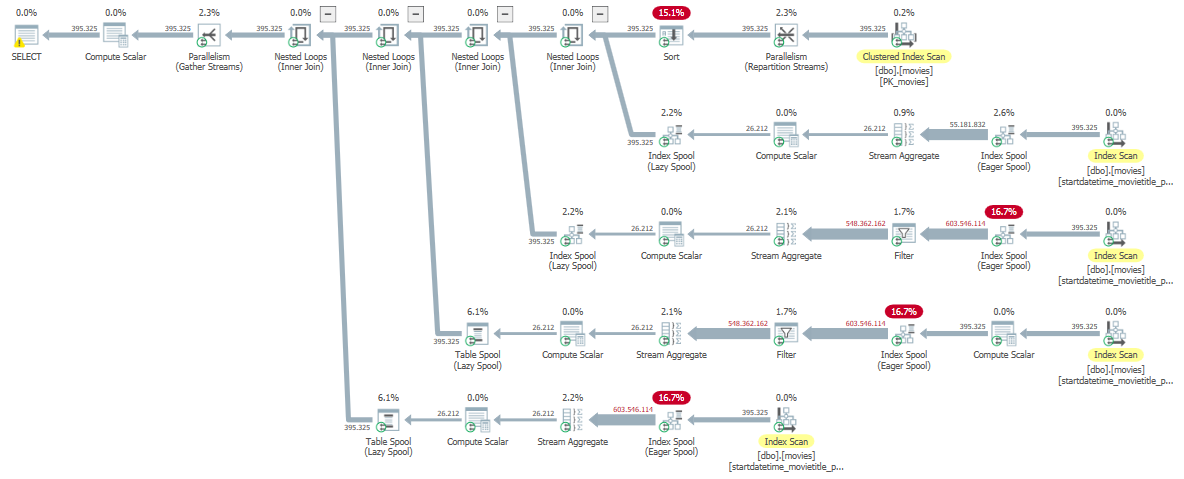I am working on a query for a table that contains movie tickets. The database holds 380k rows. A rows represents a showing of the movie (which cinema, when, how many tickets and at what price among other things).
I need to compute a few totals for every row: Admissions Paid, Admissions Revenue, Admissions Free and Total Admissions.
For a given row Admissions Paid is the sum of all tickets for that movie up until that point where price>0. The other 3 columns are computed similarly.
I wrote a query and created an index:
SELECT [ID]
,[cinema_name]
,[movie_title]
,[price]
,[quantity]
,[start_date_time]
,* --I need all the columns for reporting
,(select SUM(quantity)
from [movies] i
where i.movie_title=o.movie_title
and i.start_date_time<=o.start_date_time
and price=0) as [Admissions Free]
,(select SUM(quantity)
from [movies] i
where i.movie_title=o.movie_title
and i.start_date_time<=o.start_date_time
and price>0) as [Admissions Paid]
,(select SUM(quantity*price)
from [movies] i
where i.movie_title=o.movie_title
and i.start_date_time<=o.start_date_time
and price>0) as [Admissions Revenue]
,(select SUM(quantity)
from [movies] i
where i.movie_title=o.movie_title
and i.start_date_time<=o.start_date_time) as [Total Admissions]
FROM [movies] o
I created the following index which brought the query time down to 5 minutes:
CREATE NONCLUSTERED INDEX [startdatetime_movietitle_price] ON [dbo].[movies]
(
[movie_title] ASC,
[start_date_time] ASC,
[price] DESC
)
INCLUDE ( [quantity]) WITH (PAD_INDEX = OFF, STATISTICS_NORECOMPUTE = OFF, SORT_IN_TEMPDB = OFF, DROP_EXISTING = OFF, ONLINE = OFF, ALLOW_ROW_LOCKS = ON, ALLOW_PAGE_LOCKS = ON) ON [PRIMARY]
GO
But this index brought the query time down to 1:30:
CREATE NONCLUSTERED INDEX [startdatetime_movietitle_price] ON [dbo].[movies]
(
[start_date_time] ASC,
[movie_title] ASC,
[price] DESC
)
INCLUDE ( [quantity]) WITH (PAD_INDEX = OFF, STATISTICS_NORECOMPUTE = OFF, SORT_IN_TEMPDB = OFF, DROP_EXISTING = OFF, ONLINE = OFF, ALLOW_ROW_LOCKS = ON, ALLOW_PAGE_LOCKS = ON) ON [PRIMARY]
GO
So my question is: why? From my understanding, it makes more sense to first gather all the movie titles and then look at the start times because there are more start times then there are movies. Distinct movies: 51, distinct start_date_times: 8786
Doesn't the underling B-Tree not cut off more branches if it eliminates the unnecessary start_date_times first?
Here are the execution plans:
The first picture shows the execution plan for the index with movie_title first, the other picture shows start_date_time first.



Distinct movies: 51, distinct start_date_times: 8786; some hints could be at the logical reads and in the execution plan(s). For an index, it's very important the first column and how selective it is